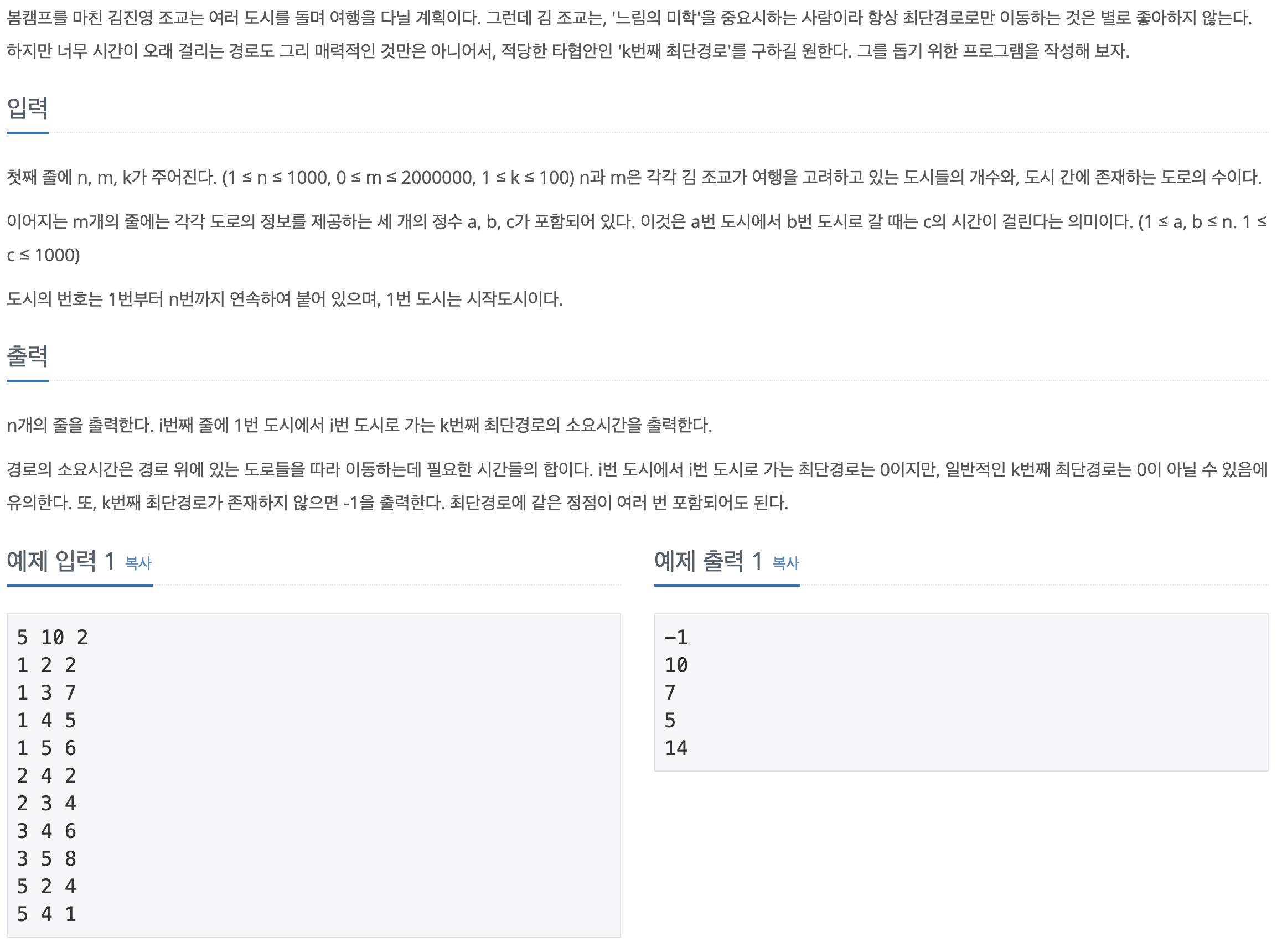[백준 1854 : JAVA] K번째 최단경로 찾기 / 다익스트라
문제

풀이
다익스트라 알고리즘 응용 문제다.
일반적으로 다익스트라에서 다른 모든 노드로의 최단경로 비용을 저장하기 위해 int형 1차원 배열을 사용하는데 반해, 우선순위 큐 타입의 1차원 배열을 사용해야 하는게 포인트다.
우선순위 큐의 용량을 K개로 할당한 후, 내림차순으로 정렬을 조정해주면 우선순위 큐의 가장 앞의 원소가 K번 째 최단경로의 비용이 된다.
코드
import java.util.*;
import java.io.*;
public class Main {
private static BufferedReader br = new BufferedReader(new InputStreamReader(System.in));
private static int N, M, K;
private static List<Node>[] edge;
private static PriorityQueue<Integer>[] dist;
static class Node implements Comparable<Node> {
int v, weight;
public Node(int v, int weight){
this.v = v;
this.weight = weight;
}
@Override
public int compareTo(Node o) {
return this.weight - o.weight;
}
}
public static void main(String[] args) throws IOException {
StringTokenizer st = new StringTokenizer(br.readLine());
N = Integer.parseInt(st.nextToken());
M = Integer.parseInt(st.nextToken());
K = Integer.parseInt(st.nextToken());
init();
for (int i = 0; i < M; ++i) {
st = new StringTokenizer(br.readLine());
int u = Integer.parseInt(st.nextToken());
int v = Integer.parseInt(st.nextToken());
int weight = Integer.parseInt(st.nextToken());
edge[u].add(new Node(v, weight));
}
dijkstra(1);
print();
br.close();
}
private static void dijkstra(int start) {
PriorityQueue<Node> pq = new PriorityQueue<>();
pq.add(new Node(start, 0));
dist[start].add(0);
while (!pq.isEmpty()) {
Node cur = pq.poll();
for (Node next : edge[cur.v]) {
if (dist[next.v].size() < K) { // 저장된 최단비용의 수가 K개 이하
dist[next.v].add((cur.weight + next.weight) * -1);
pq.add(new Node(next.v, cur.weight + next.weight));
} else if ((dist[next.v].peek() * -1) > cur.weight + next.weight) {
dist[next.v].poll();
dist[next.v].add((cur.weight + next.weight) * -1);
pq.add(new Node(next.v, cur.weight + next.weight));
}
}
}
}
private static void print() {
for (int i = 1; i <= N; ++i){
if (dist[i].size() == K) System.out.println(dist[i].peek() * -1);
else System.out.println(-1);
}
}
private static void init() {
dist = new PriorityQueue[N + 1];
edge = new ArrayList[N + 1];
for (int i = 0 ; i < N + 1; ++i) {
dist[i] = new PriorityQueue<>(K);
edge[i] = new ArrayList<>();
}
}
}'Algorithm > Baekjoon' 카테고리의 다른 글
| [백준 2842 : JAVA] 집배원 한상덕 / BFS + 투 포인터 (0) | 2020.10.27 |
|---|---|
| [백준 2531 : JAVA] 회전 초밥 / 투 포인터 (0) | 2020.10.26 |
| [백준 1238 : JAVA] 파티 / 다익스트라 (0) | 2020.10.22 |
| [백준 2610 : JAVA] 회의준비 / 플로이드 와샬 + DFS (0) | 2020.10.18 |
| [백준 17071 : JAVA] 숨바꼭질 5 / BFS (0) | 2020.10.02 |
댓글
이 글 공유하기
다른 글
-
[백준 2842 : JAVA] 집배원 한상덕 / BFS + 투 포인터
[백준 2842 : JAVA] 집배원 한상덕 / BFS + 투 포인터
2020.10.27 -
[백준 2531 : JAVA] 회전 초밥 / 투 포인터
[백준 2531 : JAVA] 회전 초밥 / 투 포인터
2020.10.26 -
[백준 1238 : JAVA] 파티 / 다익스트라
[백준 1238 : JAVA] 파티 / 다익스트라
2020.10.22 -
[백준 2610 : JAVA] 회의준비 / 플로이드 와샬 + DFS
[백준 2610 : JAVA] 회의준비 / 플로이드 와샬 + DFS
2020.10.18